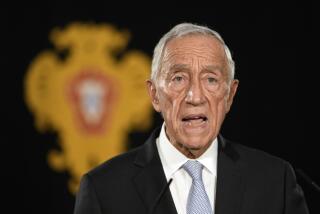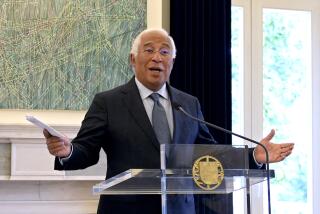Brazil’s Finance Minister Quits in Rift Over Sarney’s Austerity Measures
- Share via
RIO DE JANEIRO — Finance Minister Luiz Carlos Bresser Pereira resigned Friday in a dispute with President Jose Sarney over proposed tax and austerity measures aimed at reducing Brazil’s huge government deficit.
Bresser, who took the job in April, was the third finance minister to quit since Sarney took office in March, 1985. Like Bresser, the previous ministers resigned under the pressure of double-digit monthly inflation and the largest foreign debt--now $113 billion--owed by a developing country.
A major cause of the inflation has been the government deficit, estimated at more than 6% of Brazil’s gross domestic product. Bresser recently proposed a fiscal package that included a series of tax increases to raise revenues and the elimination of several government agencies and enterprises to reduce expenditures.
He told reporters Friday night in Brasilia, the national capital, that Sarney had refused to eliminate any agencies or enterprises until next month.
The two also disagreed on a proposal by Bresser for an executive decree to increase taxes on interest, dividends and capital gains. Sarney argued that such tax increases should be made through congressional legislation rather than by decree, Bresser said.
He said Sarney’s position was “not reasonable,” because those taxes would be delayed and other proposed tax increases would put an unfair burden on wage earners.
“For that reason, I told the president that I could not agree,” Bresser said. “The president insisted that I stay, but I said no.”
A 52-year-old former economics professor, Bresser succeeded Dilson Funaro as head of the Finance Ministry. Funaro’s 1986 price freeze program ended in failure, depleting Brazil’s foreign currency reserves, and the country declared a moratorium on its debt to private foreign banks last February.
Monthly inflation reached 20% in April, the month Funaro resigned. Bresser imposed a new price freeze program in June, but it also failed and inflation was back up to 12.8% in November.
Under Bresser, Brazil has negotiated an interim agreement with foreign banks and will resume payments on its debt, at least temporarily. Bresser’s successor will face the task of trying to negotiate a long-term agreement with the banks.
Until a successor is appointed, Bresser’s position will be filled by Mailson do Nobrega, the finance ministry’s No. 2 official and a friend of Sarney.
Among persons who have been mentioned as possible candidates for the job are Camilo Calazans, president of the government-owned bank, Banco do Brasil.
Calazans is regarded as a non-political technocrat. Bresser, however, belongs to the Brazilian Democratic Movement Party, which controls both houses of Congress.
Sarney appointed Bresser in April under pressure from the party. Since then, relations between the party and Sarney have been increasingly strained, and analysts frequently accused Sarney of giving Bresser only lukewarm support.
On Thursday, amid speculation that Bresser was about to resign, Sarney said through a spokesman: “No finance minister in the history of the country has had as much support from the president of the republic as Minister Bresser Pereira.”
More to Read
Sign up for Essential California
The most important California stories and recommendations in your inbox every morning.
You may occasionally receive promotional content from the Los Angeles Times.













